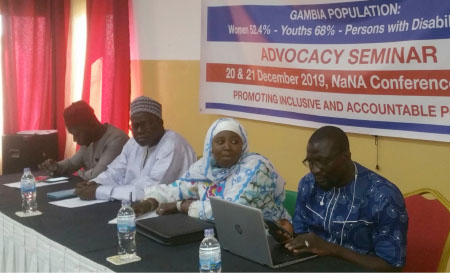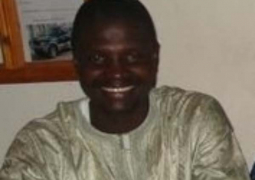
Permanent
Secretary of the ministry of women and children affairs have resounded Gambia
government continued commitment in addressing the challenges and concerns in
the inclusion of women, youth and persons with disabilities in national
development process.
Addressing
a two-day advocacy seminar for National Assembly Members on inclusion,
participation and representation of women, youth and people with disabilities
last Friday, Rohie Bittaye-Darboe said her ministry will ensure the enactment
of the Persons with Disability Bill by 2020.
Held
at the National Nutrition Agency (NaNA) conference center in Bakau, the seminar
discussed around the issues of inclusion, participation and representation of
youth, women and the disables with the wider objective to enhance the political
space to strengthen democracy and good governance
The
permanent secretary also assured that her ministry will progressively implement
the United Nations Convention on the Rights of Persons with Disabilities that
was ratified by the government of The Gambia in July 2015.
“The
priority of my ministry focuses on the empowerment of women and persons with
disabilities for inclusive, equitable and sustainable development as envisaged
in the 2030 Agenda which pledges to leave no one behind and recognize gender
and disabilities as cross-cutting issue to be considered in the implementation
of its 17 Sustainable Development Goals. Civil society and the private sector
are also taking the lead in supporting the inclusion of persons with
disabilities at global, regional, national and local level,” she stated.
According to her, women, youth and people with
disabilities need can play leading roles in the country, saying it is important
for everyone to understand that change in the political situation depends on
the participation of all on equal terms.
Dembo
Kambi, chairperson of the National Youth Council said virtually 68% of the
country’s population is young people and they should not be exempted from key
decisions making.
“Youth,
women and persons with disabilities are the first and last causalities in any form
of conflicts and therefore their participation and involvement in decision
making processes speak volume in the determining a country’s future,” he said.
Mr
Kambi said they are not only going to rely on the government but called on all
the political parties to give their quarter to young people so that they would
be able to participate in partisan politics.
“As a country, we must design good plans and
policies, be it at the legislative, judiciary or cabinet levels. We must always
cater for the participation of young people in all these categories and stages
of development process.”


